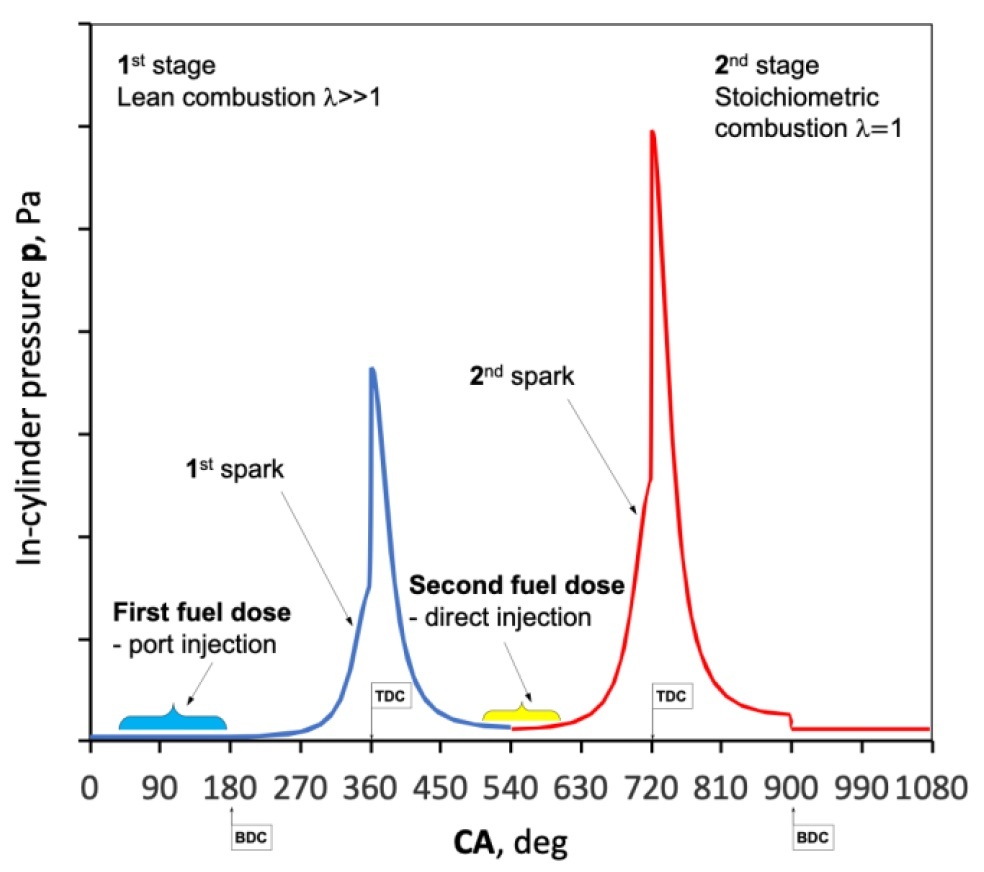Current issue
Online first
Archive
About the Journal
Aims and scope
Publisher and Editorial
Advertising policy
For Authors
Paper review procedures
Procedures protecting authentic authorship of papers
Paper preparation manual
Plagiarism check
Publication ethics
Reviewers
APC
Editorial and Scientific Board
Contact
Reviewers
Six-stroke spark-ignition engine fuelled with high-hydrogen content fuel: a theoretical thermodynamic analysis
1
Engineering Center, UFPel, Brazil
2
Institute of Thermal Technology, SUT, Poland
Submission date: 2025-07-02
Final revision date: 2025-10-07
Acceptance date: 2025-10-21
Online publication date: 2025-11-22
KEYWORDS
TOPICS
ABSTRACT
This work presents a thermodynamic analysis of a six-stroke cycle implemented in Spark-Ignition (SI) engines. The cycle configuration comprises two distinct combustion phases: (1) initial combustion of a methane-hydrogen mixture under fuel-lean conditions (λ > 1), yielding exhaust gases containing residual oxygen, followed by (2) secondary hydrogen injection during the expansion phase to facilitate complete utilization of the remaining oxidizer. The investigation evaluates the system's thermodynamic performance through parametric variation of both the fuel composition (methane/hydrogen, CH4/H2 ratio) and the equivalence ratio during primary combustion. The results obtained indicate that the changes in the peak temperature of the second part of the cycle are small, up to 60 K relative to the mean value. The fuel mixture with λ = 3.0 showed the highest cycle efficiency at 50.73%, indicating the best performance among all cases. According to the data, better performance can be achieved by optimizing cycle parameters such as regeneration, intercooling, pressure ratios, and component efficiencies in addition to raising the maximum temperature. In conclusion, better outcomes are not always guaranteed by higher temperatures. Increasing thermal input alone is not as important as designing and optimizing cycles efficiently.
REFERENCES (15)
1.
Ahmad A, Yadav K, Hasan S. Biogas as a sustainable and viable alternative fuel for diesel engines: a comprehensive review of production, purification, and performance evaluation. P I Mech Eng D-J Aut. 2024;238:325-345. https://doi.org/10.1177/095440....
2.
Aktaş F. Performance and emission prediction of hydrogen addition to natural gas powered engine using 0/1 dimensional thermodynamic simulation. International Journal of Energy Studies. 2022;7:67-81. https://dergipark.org.tr/tr/pu....
3.
Conklin C, Szybist P. A highly efficient six-stroke internal combustion engine cycle with water injection for in-cylinder exhaust heat recovery. Energy. 2010;35:1658-1664. https://doi.org/10.1016/j.ener....
4.
Fuwu Y, Lei X, Yu W. Application of hydrogen enriched natural gas in spark ignition IC engines: from fundamental fuel properties to engine performances and emissions. Renew Sustain Energy Rev. 2018;82:1457-1488. https://doi.org/10.1016/j.rser....
5.
Ghazi K. Hydrogen as a spark ignition engine fuel. Int J Hydrog Energy. 2002;28:569-577. https://doi.org/10.1016/S0360-....
6.
Iafrate N, Matrat M, Zaccardi M. Numerical investigations on hydrogen‑enhanced combustion in ultra‑lean gasoline spark‑ignition engines. Int J Engine Res. 2021; 22:375-389. https://doi:10.1177/1468087419....
7.
Lee S, Yi H, Jang H, Park C, Kim C. Evaluation of emission characteristics of a stoichiometric natural gas engine fueled with compressed natural gas and biomethane. Energy. 2021;216: 19376. https://doi: 10.1016/j.energy.2021.119766.
8.
McTaggart-Cowan P, Rogak N, Munshi R, Hill G, Bushe K. Combustion in a heavy-duty direct-injection engine using hydrogen–methane blend fuels. Int J Engine Res. 2009;10. https://doi.org/10.1243/146808....
9.
Rasi S, Läntelä J, Rintala J. Trace compounds affecting biogas energy utilization – a review. Energy Conv Manag. 2011;52:3369-3375. https://doi.org/10.1016/j.enco....
10.
Sierens R, Demuynck J, Vancoillie J, Sileghem L, Verhelst S. Efficiency comparison of hydrogen fuelled IC engines with gasoline and methanol fuelled engines. Conference proceedings of Hypothesis IX (paper HYP-024), San José, Costa Rica. 2011.
11.
Swinbourn N, Li C, Wang F. A comprehensive review on biomethane production from biogas separation and its techno-economic assessments. Chem Sus Chem. 2024;17:1-37. https://doi.org/10.1002/cssc.2....
12.
Teoh Y, How H, Le T, Nguyen H, Loo D, Rashid T et al. A review on production and implementation of hydrogen as a green fuel in internal combustion engines. Fuel. 2023;333:126525. http://doi.org/10.1016/j.fuel.....
13.
Turns R. An introduction to combustion: concepts and applications. 3rd ed. McGraw-Hill, New York 2012.
14.
Verhelst S, Wallner, T. Hydrogen-fueled internal combustion engines. Prog Energy Combust Sci. 2009;35:490-527. https://doi.org/10.1016/j.pecs....
15.
Wróblewski P, Bratkowski P. Effect of using a combination of coatings on reducing structural defects in the working area of the combustion chamber and on the energy efficiency of a reciprocating internal combustion engine. Combustion Engines. 2025;202(3):118-130. https://doi.org/10.19206/CE-20....
Share
RELATED ARTICLE
We process personal data collected when visiting the website. The function of obtaining information about users and their behavior is carried out by voluntarily entered information in forms and saving cookies in end devices. Data, including cookies, are used to provide services, improve the user experience and to analyze the traffic in accordance with the Privacy policy. Data are also collected and processed by Google Analytics tool (more).
You can change cookies settings in your browser. Restricted use of cookies in the browser configuration may affect some functionalities of the website.
You can change cookies settings in your browser. Restricted use of cookies in the browser configuration may affect some functionalities of the website.



